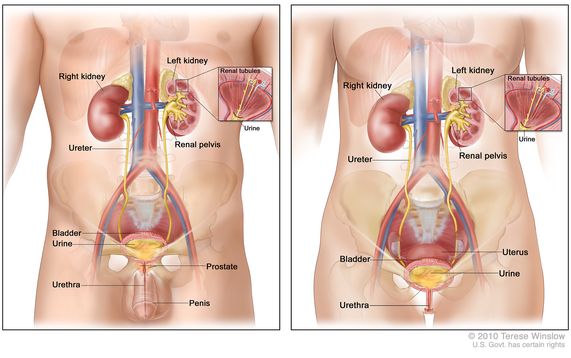Checking Out the Effects and Causes of Kidney Stones in Comparison to Urinary System System Infections: A Detailed Guide
The exploration of kidney stones and urinary system infections (UTIs) reveals an intricate interplay of symptoms and underlying causes that necessitate cautious assessment. While both problems can bring about hematuria, they present distinct clinical functions and develop from various etiological elements. Comprehending the nuances of each condition is important for effective medical diagnosis and management. What are the essential distinctions in their signs, and just how might these inform therapy strategies? The solution to these questions may offer crucial insights right into the avoidance and treatment of these typical urological problems.
Overview of Kidney Stones
Kidney stones, additionally called kidney calculi, form when particular substances in the pee crystallize and aggregate, bring about the growth of tough deposits within the kidneys. These rocks can differ in size, ranging from a grain of sand to a golf round, and can be composed of various materials, the most typical being calcium oxalate, uric acid, struvite, and cystine. The formation of kidney rocks is influenced by several factors, consisting of nutritional routines, liquid consumption, and genetic predisposition.
Symptoms of kidney rocks may include extreme pain in the back or side, blood in the pee, nausea or vomiting, and frequent peeing, especially as the rock relocates with the urinary tract. Medical diagnosis commonly entails imaging studies such as ultrasound or CT scans, together with urinalysis to determine the stone's composition.
Therapy options differ based on the size and sort of stone, along with the severity of symptoms (Kidney Stones vs UTI). Little rocks might pass naturally with raised fluid intake, while larger stones may need clinical interventions such as lithotripsy or surgical removal. Comprehending the pathophysiology and threat elements related to kidney stones is important for effective avoidance and monitoring
Introduction of Urinary Tract Infections
Urinary system tract infections (UTIs) prevail microbial infections that influence any kind of part of the urinary system, including the kidneys, ureters, bladder, and urethra. They mainly take place when microorganisms, frequently from the stomach system, enter the urinary system, bring about inflammation and infection. UTIs are classified right into 2 major types: straightforward and complicated. Straightforward UTIs usually happen in healthy people with typical urinary systems, while difficult UTIs may occur in individuals with underlying conditions, such as structural abnormalities or compromised immune systems.
The prevalence of UTIs is especially greater in women than guys, primarily due to anatomical distinctions, such as a shorter urethra. Danger elements consist of sex, particular contraceptive methods, urinary retention, and dehydration. The medical diagnosis of UTIs is normally validated via urine examinations, which may reveal the visibility of germs, white blood cells, or red cell.

Signs of Kidney Stones
The discomfort linked with kidney stones can show up in numerous methods, commonly leading individuals to look for medical attention. One of the most usual signs is extreme discomfort, generally local in the reduced back or side, which might radiate to the abdominal area or groin. This pain, typically explained as sharp or cramping, can take place suddenly and might vary in intensity.
Furthermore, individuals may experience hematuria, or blood in the urine, which can vary from tiny quantities to noticeable discoloration. This sign may be come with by adjustments in urinary system habits, such as raised regularity or seriousness, in addition to discomfort throughout peeing. Nausea or vomiting and throwing up are additionally prevalent, commonly resulting from the body's response to intense discomfort.
In many index cases, individuals may experience fever and chills, especially if a second infection develops due to the blockage brought on by the stones. On the whole, the mix of severe discomfort, hematuria, altered urinary patterns, and gastrointestinal symptoms can give significant insight right into the existence of kidney rocks, warranting prompt medical analysis and intervention. Comprehending these signs is crucial for prompt medical diagnosis and reliable management of the problem.
Signs of Urinary System System Infections
Infections within the urinary system system typically offer a variety of distinct symptoms that can considerably affect life. One of the most usual signs include a persistent desire to pee, commonly accompanied by a burning sensation throughout urination, called dysuria. People might likewise experience raised frequency of urination, generating small amounts of pee each time.
Other remarkable symptoms include cloudy or reeky urine, which might show the visibility of microorganisms or pus. Sometimes, urine might appear red or pink as a result of the existence of blood, a problem recognized as hematuria. Additionally, individuals might experience pelvic pain or stress, which can even more exacerbate the sensation of urgency.
Systemic signs and symptoms may additionally manifest, such as high temperature, cools, and exhaustion, specifically if the infection has risen to the kidneys. It is vital to recognize these symptoms early, as untreated urinary system tract infections can bring about more serious issues. Kidney Stones vs UTI. Motivate clinical interest is encouraged when these signs and symptoms are observed, enabling for ideal diagnostic analysis and treatment to alleviate discomfort and avoid more health issues
Reasons For Each Problem
Regularly, kidney rocks and urinary tract infections occur from distinctive yet sometimes overlapping reasons that can influence individuals in different ways. Dehydration, inadequate fluid consumption, and high-sodium diet plans can exacerbate these problems, advertising formation within the urinary system system.

Recognizing these distinct investigate this site causes is vital for avoidance and treatment. Kidney Stones vs UTI. While way of life alterations might minimize the danger of kidney stones, ideal health and punctual therapy of urinary tract infections are crucial for reducing their recurrence and associated issues
Final Thought
In recap, kidney stones and urinary tract infections present distinctive signs and underlying causes. Kidney stones are defined by extreme discomfort and metabolic variables, while urinary system tract infections largely include bacterial infections leading to urinary system necessity and pain.
The expedition of kidney rocks and urinary system tract infections (UTIs) discloses a complex interplay of signs and underlying reasons that warrant this hyperlink careful evaluation.Urinary system tract infections (UTIs) are common microbial infections that impact any type of component of the urinary system, including the kidneys, ureters, bladder, and urethra.Regularly, kidney stones and urinary system infections arise from distinctive yet in some cases overlapping reasons that can influence people in different ways.In recap, kidney rocks and urinary tract infections existing distinctive symptoms and underlying causes. Kidney stones are characterized by serious discomfort and metabolic aspects, while urinary system system infections primarily involve microbial infections leading to urinary system urgency and pain.
Comments on “Recognizing the Differences Between Kidney Stones vs UTI: Trick Signs and Treatments”